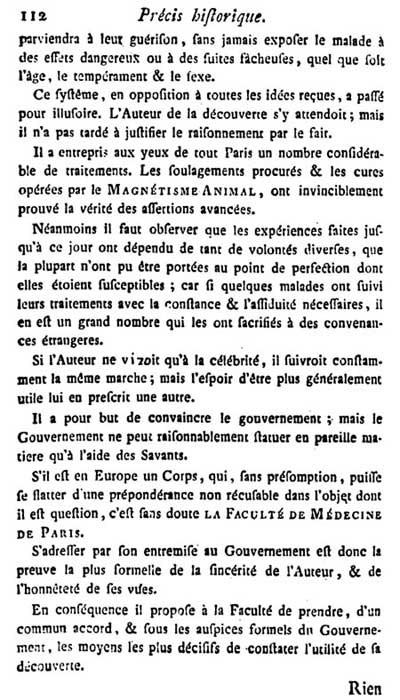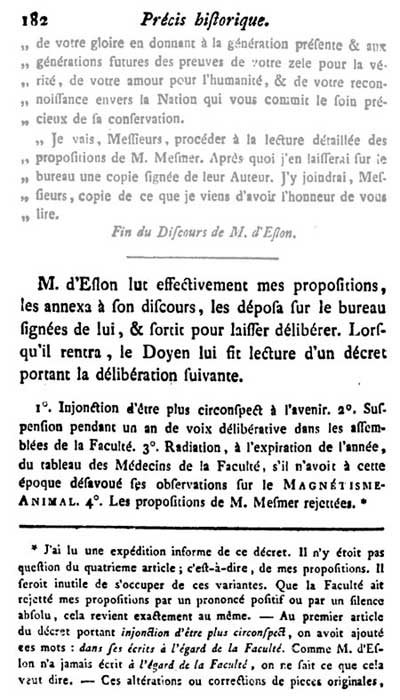Title page(s)
Key passage(s)
Translation
“I sent to M. d’Eslon the proposals that I begged him to present to the Assembly. Here they are:
M. Mesmer’s proposals to the Faculté de Médecine de Paris
The discovery of Animal Magnetism resulted in the printing of a Memoir1 in which it is set out that Nature offers a universal method of curing and of preserving [the health of] Men: that, with this knowledge the doctor can judge with certainty of the origin, nature and progression of all maladies, even the most complicated; that with it he will be able to prevent their increase and bring about their cure without ever exposing the patients to dangerous effects or unfortunate outcomes, whatever their age, temperament and sex.”
Translation
“This system, which is different to all received ideas, has been regarded as being an illusion; the Author of the discovery expected this but he was not slow in justifying his reasoning by deeds.
He undertook, before the eyes of all Paris, a considerable number of treatments and the improvements produced and the cures brought about by Animal Magnetism have incontrovertibly proved the truth of his assertions.
Nevertheless, it must be said that the experiments carried out until the present have been undertaken for so many different reasons that most of them could not be carried to the point of perfection of which they were capable, and that, while some patients followed their treatment with the required constancy and application, many abandoned it to vicarious circumstances.
Had the Author sought only celebrity he would have continued on the same course, but his desire to be more generally useful moved him to behave otherwise.
He aims to convince the government, but the government cannot reasonably come to a decision on such a subject without the aid of the learned.
If there is a body in Europe which, without presumption, may flatter itself as having the most unprejudiced authority about the subject in question it is undoubtedly the Faculté de Médecine de Paris. Addressing the government by its intermediary is thus the most formal proof of the Author’s sincerity and the honesty of his opinions.
Thus he asks the Faculté to take, in accord with and under the formal auspices of the government, the most decisive means of demonstrating the usefulness of his discovery.”
Translation
“Nothing would appear to lead more directly to this end than a comparative trial of the new method against the old ones.
Since the administration of the usual remedies could not be in better hands than those of the Faculté, it is clear that if the new method were to have the advantage over the old, the proofs in its favour would be the more decisive.
Here are some of the arrangements that could be put in place in this respect. It is unnecessary to say that on both sides the greatest freedom of opinion must be upheld, and that each must have equal authority over the patients subjected to each treatment.
The intervention of the government must be sought; but, since it is easy to believe that a request from a body such as the Faculté must carry more weight than that from an individual, it would be appropriate that, before anything else, the Faculté should take on itself this negotiation.
Twenty-four patients are to be chosen of whom twelve will be reserved to the Faculté to be treated by the ordinary methods: the other twelve will be assigned to the Author who will treat them according to his particular method.
The Author excludes from the selection all Venereal diseases.
In the first instance written reports will be made of the condition of each patient: each report will be signed by the Commissioners of the Faculté, by the Author and by the persons appointed by the government.
The selection of patients will be made by the Faculté or by the Faculté and the Author together.
In order to avoid any later argument and all the questions that could be raised about differences in age, in temperament, in diseases, in their symptoms etc. the assignment of the patients shall be made by the method of lots.”
Translation
“The form of each comparative examination of the patients, and when these will be carried out, shall be fixed in advance so that no reasonable argument can arise later about the improvement obtained by either method.
Since the Author’s method involves little expense, he will not ask for any recompense for his work; but it would seem reasonable that the government should take on itself the costs of the maintenance of the twenty-four patients.
The persons appointed by the government shall be present at each examination and shall sign the written reports: however, as3 it is essential to avoid any suspicion by the Public of special knowledge or of collusion, it will be indispensable that the government’s nominees are not members of any medical body.
The Author flatters himself that the Faculté de Médecine de Paris will not see anything in the above proposals but just homage rendered to its distinction and the desire that a truth which may be of the greatest advantage to the Nation may be seen to prosper by the efforts of a Body dear to that Nation.”
Translation
“M. Deslon read my proposals convincingly, and attached them, signed by himself, to [the text of] his speech, placed them on the table and went out to allow the assembly to deliberate them. When he returned the Dean caused a resolution to be read to him saying the following:
1. [M. Deslon is] required to be more circumspect in the future.
2. [He is] suspended from taking part in the deliberations of assemblies of the Faculté for a year.
3. [He is] to be struck off the list of the Doctors of the Faculté at the end of the year if he has not, by then, renounced his observations on Animal Magnetism.
4. The proposals of M. Mesmer are rejected. *
——————————————————————————–
* I [Mesmer] have read an inaccurate version of this decree in which the fourth article – the one about my proposals – was missing. It would be pointless to concern oneself with these variants; whether the Faculté rejected my proposals with a positive statement or by its complete silence [on the subject] it comes to exactly the same thing…”
Translation by IML Donaldson
Portrait(s)
Other material(s)
Acknowledgements
The editors are grateful to:
The Bibliothèque Nationale de France, for permission to reproduce the images of pages from the digitized copy of Mesmer, F. A. 1781 Précis historique des faits relatifs au magnétisme animal jusques en avril 1781. …. on its digital library, Gallica. (http://gallica.bnf.fr)
The Wellcome Trust for making available the portrait of Franz Anton Mesmer (1734-1815).







